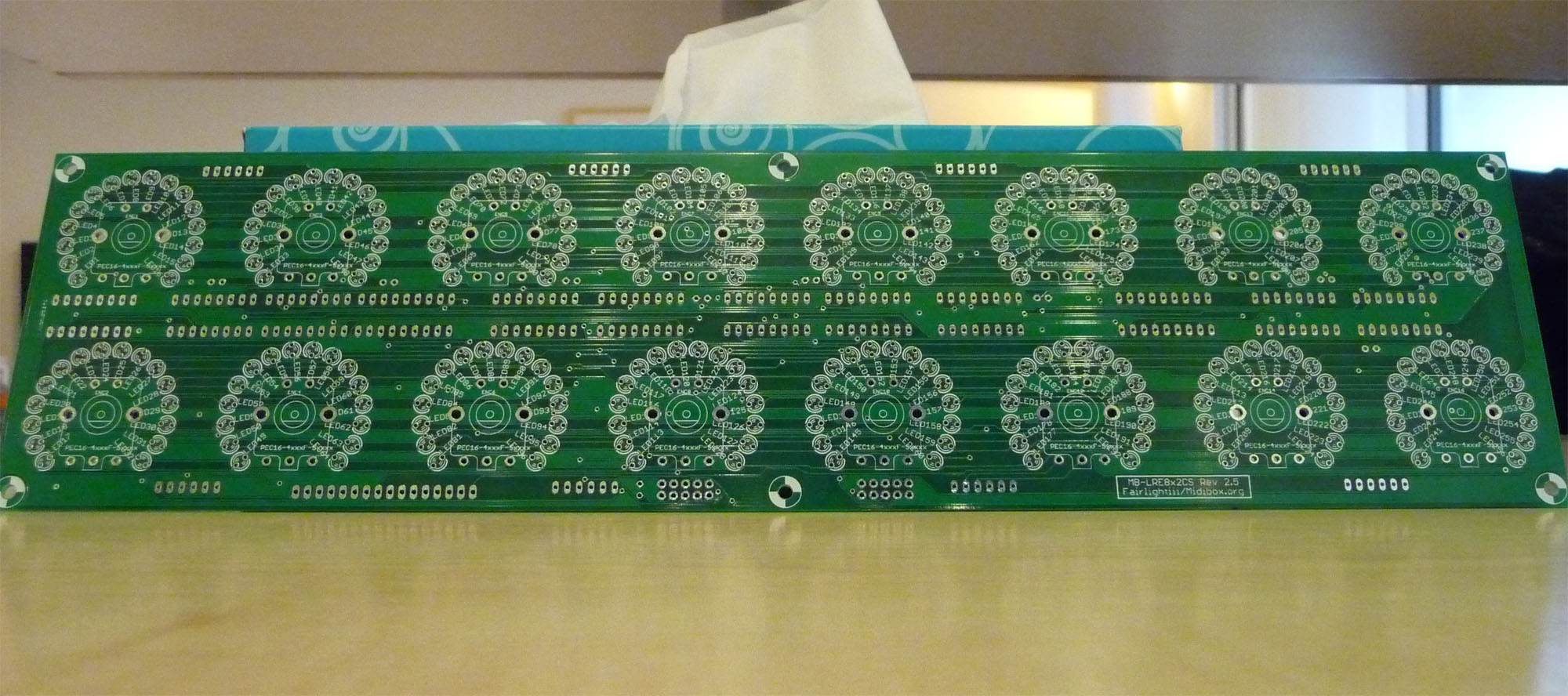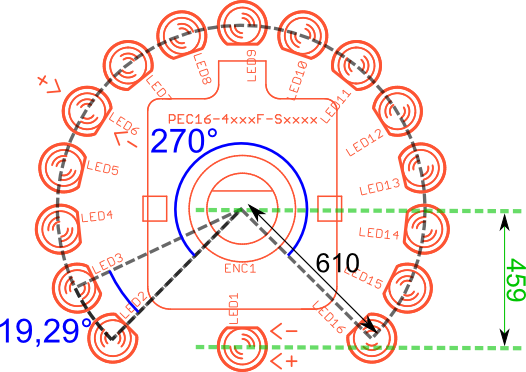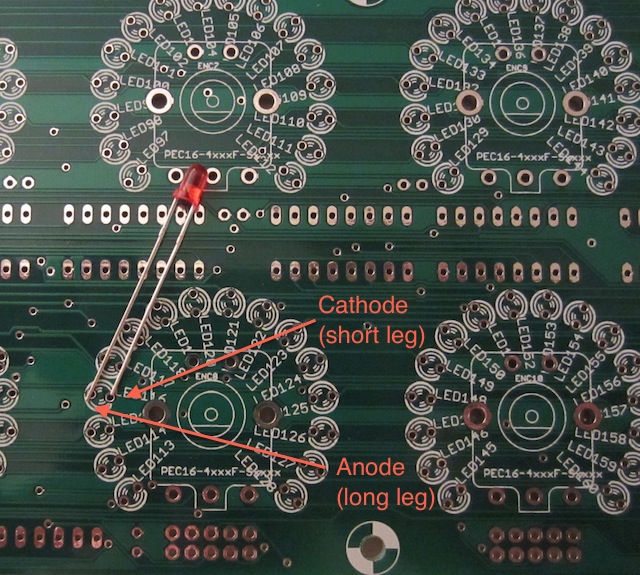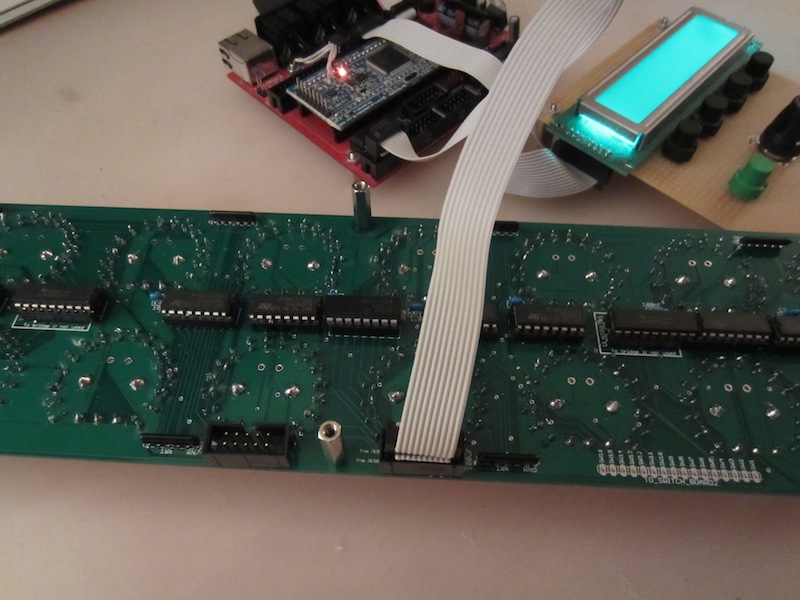This is an old revision of the document!
Table of Contents
MB-LRE8x2CS rev 4.6
16 LEDrings / 16 Encoders Control Surface PCB
Welcome to the wiki page of the control surface board featuring:
- DINx4 module,
- Improved DOUTx4 module,
- 16 LEDrings of (15+1) LEDs each,
- 16 encoders (with or without switch).
The last revision of the PCB is rev 4.6.
It is a very practical and cheap way to make a midi controller with adding only a core or make a more important controller without having to wire LEDrings.
PCB
The PCB have components soldered on the two sides.
Top side: Encoders and LEDs.
Back side: All others components (see BOM below).
The board is 3,335 x 13,452 inch (341,7 x 85,1 mm): slightly less than 2U standard.
The previous revision (2.5) was 3,368 x 13,472 inch (342,2 x 85,5 mm).
The (external) diameter of each LEDring is 34 mm with the use of 3mm LED.
To comply to the footprint of 2x5x7mm rectangular LEDs, the diameter (from the centers of the LEDs -except the lowest one) of the LEDring is now slightly less than 31mm instead of 30mm.
The pitch between each controller remains the same as in the previous version (1,684 inch).
Pictures
Mix of the Rev2.5 and protoboard pictures (Note this is not the last versions but they have practically the same dimensions and LEDs/Encoders positioning):
Protoboard in action:
Dimensions
All measurements are given in mils unless otherwise indicated.
1 mil = 0,001 inch = 0,0254 mm. You can use this converter utility.
Layout
You can download a better definition version (without ground surfaces for better visibility) here.
Silkscreen
Schematic
You can download a better definition version here.
Coordinates
The origin (0;0) is the bottom left corner of the board.
Note: Be very careful if you use vectorial software (to draw your front panel e.g.) because usually it takes as origin of each part the left corner of the part and not the center of the part !!!
You can take also a look at the *.SVG section below.
LEDs/Encoders
You will find the coordinates of LEDs/Encoders in this files.
You will note that the encoders are upside-down because to win some space inside the LEDring. Because they are endless, the use of them is not impacted.
3mm board holes
Coordinates of the six holes (in inch):
| X | Y |
|---|---|
| 1,674 | 0,15 |
| 6,726 | 0,15 |
| 11,778 | 0,15 |
| 0,15 | 3,2 |
| 6,726 | 3,2 |
| 13,302 | 3,2 |
BOM
| Qty | Device | Parts | REICHELT | MOUSER | Note |
|---|---|---|---|---|---|
| 4 | 74HC165 | IC1, IC2, IC3, IC4 | 74HC165 | 511-M74HC165 | |
| 2 | ULN2803 Transistors Darlington arrays | IC5, IC6 | ULN2803A | 595-ULN2803AN | |
| 4 | 74HC595 | SR1, SR2, SR3, SR4 | 74HC595 | 511-M74HC595 | |
| 8 | Ceramic Cap 100nF=0,1uF “104” | C1→C4 & C6→C9 | Z5U-2,5 100n | 80-C412C104K5R | |
| 1 | Polarized Electrolytic Capacitor 100 uF | C5 | rad 100/16 | 140-REA101M1CBK0611P | |
| 8 | 10k 6 Pin SIL resistor network “103” | RN3→RN10 | SIL 6-5 10K | 264-10K-RC | |
| 16 | 220 Ohm metal film resistor | R1→R16 | METALL220 | MF1/4DCT52R2200F | You won't be able to use resistor network this time because each resistor is 60° rotated |
| 2 | 2×5 pins DIL Shrouded Header | “IN”, “OUT” | WSL 10G | 710-61201021621 | Cheap model on Ebay |
| 1 | 1×16 pins SIL Header | “TO_SWITCH_BOARD” | SL1X36G 2,54 | 649-68001-416HLF | Optional (switched encoders) |
| 16 | PEC16-4020F-N0024 | ENC1→ENC16 | - | 652-PEC16-4020FN0024 | Undetended - without build-in switch |
| or | PEC16-4020F-S0024 | - | 652-PEC16-4020FS0024 | Undetended - with build-in switch | |
| 10 | Socket 16 pins | - | GS 16 | 571-1-390261-4 | Cheap model on Ebay |
| 2 | Socket 18 pins | - | GS 18 | 571-1-390261-5 | Cheap model on Ebay |
| 256 | LED 3mm or rectangular (2x5x7mm) | LED1→LED256 | LED 3MMRT | - | Reichelt model recommended |
LED black list
Since Tk discovered a brightness problem with some rectangular 5x2x7mm LEDs, we found useful to create a list of LEDs wich are successfully or unsuccessfully tested. Members are welcome to edit this page to add their LED feedback.
| Model | Type | Mcd | Link | Good | Not good | With ULNs | Author |
|---|---|---|---|---|---|---|---|
| Kingbright WP103HD | 2x5x7mm rectangular | 2 | Mouser | X | ? | Tk | |
| LED 3MM RT | 3mm round | 1.3>5 | Reichelt | X | ? | Tk | |
| “10001” | 2x5x7mm rectangular | ? | auspiciousmall.com | X | X | No(prototype) | Fairlightiii |
| Kingbright L-934ID | 3mm round | 25 | Segor Electronics | X | ? | rvlt | |
| Kingbright WP132XID | 3mm round | 10>25 | Mouser | X | No | grizz | |
| Kingbright WP132XID | 3mm round | 10>25 | Mouser | X | Yes | MaG2k | |
| Kingbright WP113SRDT | 2x5x7mm rectangular | 36>60 | Mouser | X | Yes | MaG2k | |
| smashTV is selling | 3mm round | ? | smashTV | X | Yes | MaG2k | |
| Tayda Electronics | 3mm round | ? | Tayda Electronics | X | Yes | MaG2k |
Note: Regarding condition of each test (ambient luminosity, etc…) and sensibility of each person, this results should be taken with reserve.
Components
LEDs & LEDring
Each LEDring is composed of 16 LEDs: 15 on the LEDring itself and one on the lowest part of the LEDring. Thorsten advised me about this type of implementation (odd number of LEDs) because it is an industry standard and to have better feedback for some controls (PANoramic e.g.).
You can use 3mm LEDs or 2x5x7mm rectangular LEDs (because the different angles of the LEDs in the LEDring) or all other LED with 0.1 inch (2,54 mm) leads spacing.
There's not enough space for 5mm LEDs.
The LED polarity: the cathode (short leg) has to show to the center of the LED ring:
In this revision (4.6) the silkscreen of the LEDring#1 indicate the “+” (anode) and the “-” (cathode).
Encoder
You can use 16mm “standard” encoders (ALPS STEC16, Bourns PEC16-4xxxF-Nxxxx series, encoders sell by voti, …).
You can use instead PEC16-4xxxF-Sxxxx series (with built-in switch). Probably others built-in switch encoders comply the PCB footprint but you have compare their datasheets.
16 pins SIL header
If you use switched encoders, one of the two pins of the built-in switch is grounded while the other pin is connected to a pin of this SIL connector. The silkscreen include the name of each switch.
2x5 pins DIL headers
They are 1:1 with J8/J9 of Core8/Core32/LPC17 so you can use practical IDC female Connector or still more easier pre-built 2x5 Pin IDC Ribbon Cable.
Be careful to the connection to the MBHP_CORE_LPC17 module because it could be confusing, since the SO pin of J8/9 has to be connected to the SI pin of the LRE2x8 board, and SI to the SO pin (for MBHP_DOUT/DIN we usually have the same names for these signals, this detail has been overlooked).
All should be OK in this revision.
ULN2803
This component provide more current to the matrix LED than the 74HC595 shift registers can and improve the brightness of the LEDs.
Thorsten made deepest tests on this component and he conclued that it improves greatly the current toward the LEDs matrix so it is now highly recommanded to use them.
10kOhm 6 Pin SIL resistor network
Be careful when sourcing SIL resistor networks because a 6 Pin SIL resistor network can be 5 commoned resistors (what you need here) or 3 independant resistors. A point on the silkcreen prevent to solder upside-down the resistor networks (a point is also indicated on the resistor network).
Polarized Electrolytic Capacitor 100 uF
It is the only polarized cap of the board. The silkscreen indicate the “+” and “-” signs on the board.
Diagram interconnection
One board connection
Global interconnection
You can download a better definition version here.
You can chain up to 8 (the drawing above indicates 4) of this board (MIDIbox NG). You only have to connect the “OUT” connector to the “IN” connector of the following board. You can connect yours extra DIN/DOUT modules before (“IN” connector) or after (“OUT” connector).
Software configuration
I refer you to the threads opened by Thorsten about the configuration of the MIOS in single context and 4 boards chained together.
Frontpanel *.SVG files
This is 2 useful files if you want making a frontpanel:
| 3mm round LEDs: (6x) 3mm mounting holes + (16x) 10mm encoder holes + (256x) 3mm LED holes. |
 |
| 2x5x7 rectangular LEDs: (6x) 3mm mounting holes + (16x) 10mm encoder holes + (256x) 2x5mm LED holes. |
 |
Consult your datasheet to check if the opening dimension fit your LED.
I provide all this information without warranty.
Feel free to contact me to make corrections.
Jerome aka Fairlightiii.


















